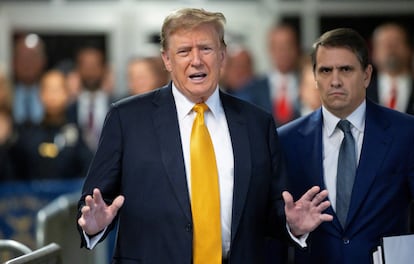Trump elects not to testify as defense rests in Stormy Daniels hush money trial
The presentation of final arguments on May 28 will give way to the deliberations of the jury, which must reach a unanimous verdict to convict the former president


Donald Trump’s defense lawyers at his criminal trial in New York concluded their case Tuesday after calling only two witnesses — neither one of them the former president, who has chosen not to testify. After the prosecution rested its case a day earlier, the presentation of final arguments will take place next Tuesday, May 28 (there is no session Monday due to Memorial Day, a federal holiday). Judge Juan Merchan said he expects the jury of 12 New Yorkers to begin deliberating next Wednesday.
During the more than five weeks of the trial the prosecution has called 20 witnesses, the penultimate and most important of them all Michael Cohen, Trump’s former right-hand man on whose testimony the 34 felony charges against the presumptive Republican nominee for the November presidential election concerning the payment of hush money to porn actress Stormy Daniels to cover up an extramarital affair is based. The irregular recording of the $130,000 payment from Trump’s personal account as “legal expenses” to reimburse his lawyer and confidant Cohen for the money he had paid Daniels while the former president was in the final stretch of his bid for the White House in 2016 — in an alleged violation of campaign finance rules — is at the center of the case. The defense called only two witnesses.
Subjected to a gag order by Judge Merchan to prevent him from criticizing witnesses and court officials, the prospect of seeing Trump on the stand was a priceless media opportunity, but his team of lawyers advised him not to expose himself under the provision in U.S. law that a defendant can invoke the right not to testify in order not to incriminate himself. Surrounded by loyal congressmen and his two eldest sons, the former president takes daily advantage of his entrances and exits at the criminal courthouse in Manhattan to denounce what he considers an illegitimate trial and political persecution on the part of his Democratic rivals.
The last witness to testify was Robert Costello, who briefly acted as a legal adviser to Cohen after the FBI raided the latter’s home and apartment in 2018. Prosecutors tried to portray him as an undercover Trump operative because he attempted to prevent Cohen from cooperating with investigators. Prosecutors showed the jury an email in which Costello complained about Cohen’s attitude because he appeared to be “playing with the most powerful man on the planet.” His testimony concluded as he protested an objection from prosecutors, prompting the judge to vacate the courtroom.
The decisive moment — the deliberation of the 12-member jury — is approaching on schedule: within the estimated six to eight weeks that the trial, the first criminal prosecution of a former U.S. president, was scheduled to last. If found guilty, Trump could be sentenced to a maximum of four years in prison. A unanimous vote of all 12 jurors is required for conviction; if they fail to reach a consensus a mistrial could be declared, which would be a major victory for the Republican presidential candidate. Of the four criminal cases against him, the New York case is the only one that will be tried before the election. If Trump is ultimately convicted, he would not be able to pardon himself if re-elected as it is a state case, not a federal one.
Cohen, portrayed by Trump’s defense as an unrepentant liar capable of stealing from his own boss, testified several days in a row in marathon sessions, in which he explained in detail an agreement between himself, Trump, and the editor of The National Enquirer tabloid, David Pecker, to buy and subsequently bury negative stories about the real estate magnate. That plot originated in 2015, a year before the election in which Trump prevailed over Democratic candidate Hillary Clinton. The payment to Stormy Daniels, ordered according to Cohen by Trump himself, was part of that conspiracy, described by prosecutors as “a criminal scheme to corrupt the 2016 presidential election.” Matthew Colangelo, the assistant district attorney who presented the opening statements, added of Trump when the trial began: “Then he covered up that criminal conspiracy by lying in his New York business records over and over and over again.”
Sign up for our weekly newsletter to get more English-language news coverage from EL PAÍS USA Edition
Tu suscripción se está usando en otro dispositivo
¿Quieres añadir otro usuario a tu suscripción?
Si continúas leyendo en este dispositivo, no se podrá leer en el otro.
FlechaTu suscripción se está usando en otro dispositivo y solo puedes acceder a EL PAÍS desde un dispositivo a la vez.
Si quieres compartir tu cuenta, cambia tu suscripción a la modalidad Premium, así podrás añadir otro usuario. Cada uno accederá con su propia cuenta de email, lo que os permitirá personalizar vuestra experiencia en EL PAÍS.
¿Tienes una suscripción de empresa? Accede aquí para contratar más cuentas.
En el caso de no saber quién está usando tu cuenta, te recomendamos cambiar tu contraseña aquí.
Si decides continuar compartiendo tu cuenta, este mensaje se mostrará en tu dispositivo y en el de la otra persona que está usando tu cuenta de forma indefinida, afectando a tu experiencia de lectura. Puedes consultar aquí los términos y condiciones de la suscripción digital.








































